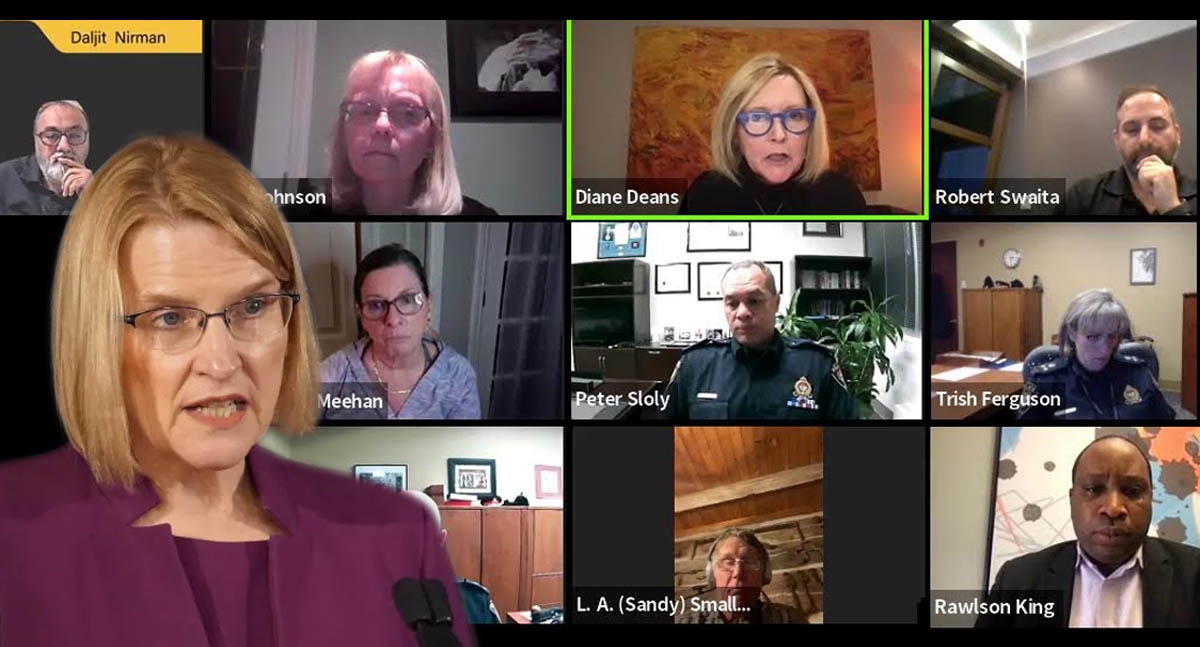
To restore confidence Solicitor General must amend police services act
ABOVE: Ontario Solicitor General Syliva Jones and Zoom image of February 2022 Ottawa Police Service Board meeting.
Anyone who witnessed the February 2022 total collapse of the Ottawa Police Services Board (OPSB) must have reached the ineluctable conclusion that the time has come to disband police services boards in the province of Ontario.
If the province’s intent when they established such boards was to improve the overall effectiveness and efficiency of policing in Ontario, one could argue that the experiment has been a colossal failure in every respect.
For more than a decade, the Ottawa Police Service (OPS) has been chaotically administered and in a constant state of crisis. No matter how you measure their performance, the fact remains, they do not possess the trust or respect of the residents of Ottawa.
Clearly, the OPSB has failed and continues to fail to provide the residents of Ottawa with a quality police service as is mandated under the Police Services Act of Ontario (PSAO).
Ontario is at a point where it either must disband police service boards or make serious changes to the way they are structured in terms of the types of members appointed and their reporting requirements. At present, the entire system is flawed, and some of that is due in part to the existing ambiguity of the PSAO.
Unless these changes are made, police service boards across the province might as well be dissolved. There is no evidence they are meeting their statutory duties and obligations when it comes to providing accountability, oversight, and management of the police services for whom they are responsible.
The way Ontario police services boards are structured under the PSAO is flawed. At present, a board comprises seven members and consists of the head of the municipal council, two members of council, three people appointed by the Lieutenant Governor in Council, and one person appointed by resolution of council. The chairperson is selected by a vote of members. However, recently we saw the Mayor of Ottawa appoint an interim chairperson following the removal of the previous chairperson by city council. The entire process needs to be completely overhauled.
The PSAO should be amended so that the chairperson of a police services board is appointed by the province and reports directly to the Solicitor General of Ontario. The Act should specify that the mayor of a municipality must hold a seat on the police services board, and attendance should be mandatory. In Ottawa, the mayor was not a full-time member of the police services board.
Policing is a provincial responsibility, and as such the province should be responsible for monitoring the operation of police service boards in the province and holding them accountable for meeting the goals and objectives as set out in the PSAO.
Another problem is that board members are not required to have any practical experience or educational qualifications related directly to the criminal justice system. This needs to change. The chairperson of a police services board must be a person who holds a degree in law or criminology and must have at least five years of experience in the criminal justice system. People without such qualifications simply can not sit on a board and make informed decisions about policies and accountability issues that govern a police service in any municipality.
Not one of the previous OPSB had any knowledge or expertise. The fact the board sank like the titanic when confronted by the truck convoy crisis came as no surprise to informed observers knowledgeable about the current policing crisis in Ottawa.
A third problem relates to the ambiguous interpretation that some members of police service boards have when it comes to what are known as ‘operational issues.’
While police service boards should not be involved in everyday law enforcement decisions on the streets of our cities and towns, they should be responsible for setting out policies, goals, and directions for the chief of police. The Solicitor General should make it absolutely clear that the chiefs of police report to the police services board and not the other way around.
Serious issues such as widespread sexual harassment or bullying in a police service should be issues dealt with by the police services board. Too often, police service boards avoid dealing with these problems by claiming they are operational issues and therefore outside of their jurisdiction. This is an erroneous interpretation of the Police Services Act of Ontario.
In his report on the 2010 Toronto G20 police fiasco, Justice Morden stated: “The Board has limited its consultative mandate and viewed it as improper to ask questions about, comment on, and make recommendations concerning operational matters. The Board’s approach in this regard has been wrong. He went on to say that “the Board should not be involved in operational decisions–that is, in day-to-day decisions about who should be arrested and so forth but nothing prevents the board from establishing operational policies, something every other corporate board of directors does. But police board members shy away from performing this important role, preferring to allow police to do what they want.”
Police service boards should be directly involved in issues relating to police accountability, sexual harassment issues, and bullying if it is affecting a police service. It’s not good enough to sit on the wings and cry that it’s operational, so we can’t get involved. The PSAO needs to be amended to clearly, unambiguously, and precisely define exactly what does and what does not constitute an operational issue.
We are at a crossroads regarding police accountability in this province. We either act and make these changes, or we abolish police services boards in the province.
At present, many people would argue that the way boards are currently operating is having a serious and detrimental effect not only on the residents of the community they are supposed to service but also on the police service that is supposed to report to them.
We either make these changes, or we will continue to experience a crisis of confidence in our police and government institutions. That is too great a price to pay.
IMAGE: VIA ZOOM











